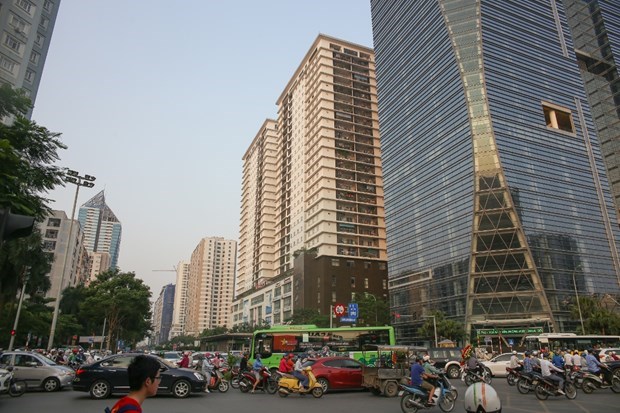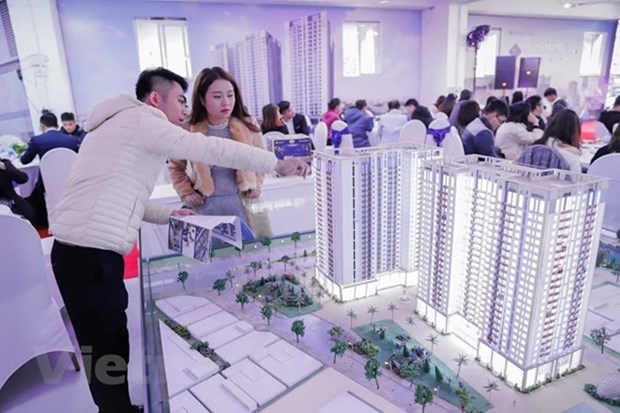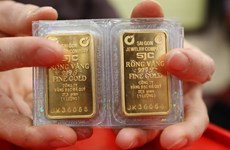COVID-19 deals second blow, real estate remains a safe haven?
 Illustrative image (Photo: VietnamPlus)
Illustrative image (Photo: VietnamPlus)
Hanoi (VNA) - While the real estate market was gradually recovering with positive signals from supply and successful transactions, the COVID-19 dealt a second blow, making it hard to forecast the market.
After nearly six months of "hibernation" caused by COVID-19, the property market has gradually recovered with rising supply and successful transactions, especially industrial real estate. But the COVID-19 outbreak inflicted a second blow, making it hard to predict whether the market remains a safe haven, or even could collapse if investors use too high financial leverage, especially if social distancing order resumes.
However, many experts and analysts commented that following the pandemic that erupted in the beginning of this year, Vietnam gained more experiences while investors also had back-up plans, thus preventing panic.
Struggling to return following pandemic
After nearly a month since the COVID-19 pandemic broke out again with a series of new infection cases found in central Da Nang city and then spread to other localities such as Quang Nam, Ho Chi Minh City and Bac Giang, many firms immediately took countermeasures such as suspending construction and changing dates of sale opening.
Not only resort property segment (condotel, resort villa or officetel) that met difficulties due to legal problems but almost other segments such as affordable housing, land, town houses and villas were also predicted to fall into the state of “hibernation” if social distancing order resumes due to the pandemic.
Specifically, in the epicenter of the second COVID-19 wave in the central city of Da Nang, social distancing was imposed again. The sale opening and project introduction sessions were cancelled because of the ban on crowd gatherings.
Dr. Can Van Luc, a financial and banking expert, said his team carried out a survey on 15 major sectors accounting for 80 percent of the gross domestic product. The result showed that real estate is one of the eight sectors hardest hit by COVID-19.
According to the survey, the total value of real estate transfers decreased by 0.4 percent year-on-year in the first seven months of this year while the industry's share prices fell 16 percent compared to the beginning of this year. Real estate was also one of the 10 sectors seeing the fastest decrease in share prices. The number of enterprises suspending operations soared by 98 percent over the same period last year.
Luc said both investors and people are gradually changing their lifestyle and consumption habits. In the pandemic context, cash is considered the "king" and the spending is also slower.
 Real estate market in the first two months of 2019 is dull with limited supply (Photo: VietnamPlus)
Real estate market in the first two months of 2019 is dull with limited supply (Photo: VietnamPlus) Additionally, the building of legal framework for real estate remains slow. Take condotel segment for example, there has not been a complete legal framework for four years, not to mention that the real estate sector has to face competition with other investment channels such as gold, Luc stressed, citing that since early this year, the gold price has increased by 27 percent in the world and 29 percent in Vietnam.
Nguyen Thi Huyen, who invested in land plots in the suburbs of Hanoi, said following the Lunar New Year festival, she switched from speculation to long-term investment in several land plots in Hoa Binh. When the market heated up, she sold them and earned little profit to “avoid” the pandemic.
"Currently, cash is still available, but in the present situation, investment in real estate must be considered thoroughly. If there are suitable products in the future, I will continue with long-term investment”, Huyen said.
Opportunities still lay amid difficulties
Nguyen Van Dinh, Deputy Secretary General of the Vietnam National Real Estate Association, said though the negative effect of the second COVID-19 outbreak is inevitable, the real estate market is developing well and only affected by external influences such as investors and international tourists. If solved, the market will grow well again.
When the pandemic was under control in May, projects nationwide were active again. Until the second wave of COVID-19 outbreak, the market still performed well, but so far a number of projects have been suspended.
Many studies also stated that when COVID-19 vaccine is officially available, the market will enter a period of reboot and recovery. At the same time, the Government is "pumping" capital into the economy through stepping up public investment, thus improving transportation infrastructure and property values.
Another highlight of the real estate market is the “rise” of industrial property segment. Among 20 Japanese enterprises that left China due to the pandemic and the US – China trade tension, 15 chose Vietnam as a safe destination to “shelter” and develop.
Sharing the same view, Luc also commented that although the real estate market is facing difficulties, there remain opportunities in three fields, including industrial real estate thanks to the shift of foreign investment to Vietnam. The second is logistic services with a recent report by Savills showing that Vietnam is one of the three most attractive logistics markets in Asia. The third is affordable housing with high demand.
Notably, tourism real estate market is forecast to continue the "hibernation" situation, especially following the Cocobay Da Nang incident and COVID-19 pandemic. If social distancing is imposed, supply, demand and transactions remain low without many changes.
Statistics from the Construction Ministry showed that real estate firms are on track to recovery following a long period of social distancing with average business performance increasing by 30-40 percent. In the second quarter, there were 92 projects nationwide with 6,300 condotels, 197 resort villas and 46 officetels, 91 underway projects with over 19,800 condotels and 8,400 villas, 12 projects with 70 condotels already built./.













